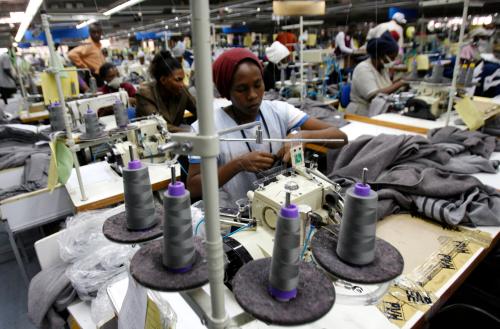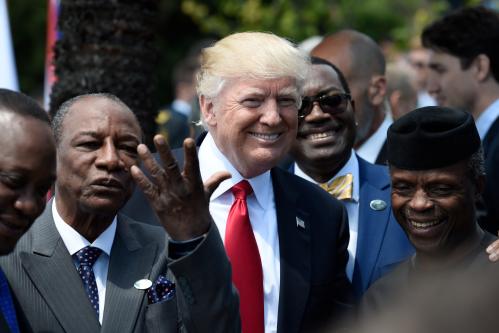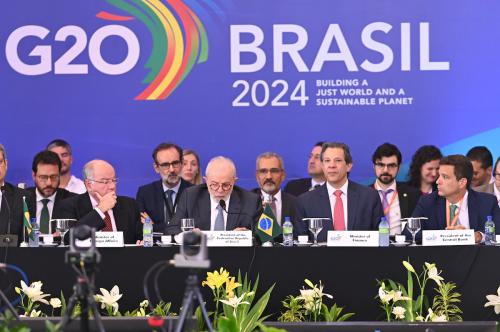The 2018 AGOA Forum—named for the African Growth and Opportunity Act passed in 2000 and extended three years ago to 2025—could be a turning point in U.S.-African commercial relations. AGOA abolished import duties on more than 1,800 products manufactured in eligible countries sub-Saharan Africa (those with established or making continuous progress with market-based economy, rule of law and pluralism, elimination of trade and investment barriers to the U.S., human rights, labor standards, fight against corruption, and economic policy to reduce poverty among others). Another 5,000 products are eligible for duty-free access under the Generalized System of Preferences program. As of today, 40 African countries are AGOA-eligible.
Regionalism vs single country trade agreements
Africa’s trade ministers will be coming to Washington the week of July 9, riding the momentum of having adopted the African Continental Free Trade Agreement in March. Once fully implemented, the AfCFTA, as it is known, requires members to remove tariffs on 90 percent of goods and to allow free access to goods, services, and commodities. The AfCFTA is central to accelerated regional integration and economic development across the region.
While Africa is forging new trade relations internally, the Trump administration has a new proposal for future U.S.-Africa trade relations, and wants to establish “a free trade agreement that could serve as a model for developing countries.” Kenya, Côte d’Ivoire, and Ghana are under consideration as partners for developing the first model according to sources in the Trump administration.
The question for this AGOA Forum is whether it can forge a common vision between Trump administration officials and Africa’s trade ministers on how to structure a post-AGOA trade relationship. Specifically, can Africa’s continental free trade ambitions, embedded in the AfCFTA, be harmonized with the Trump administration’s model free trade agreement based on a single country?
The AfCFTA should be the ideal tool to foster U.S.-Africa commercial relations, with an agreement between Africa at the continental level and the United States. American corporations benefit from a continental approach versus a country-specific one. In fact, by 2030, Africa will be home to 1.7 billion people and $6.7 trillion of combined customer and business spending. The AfCFTA presents the opportunity for a single point of entry, reduced cost of doing business, economies of scale, lower tariffs, and increased commercial transaction—which could contribute to job creation in the U.S. However, the AfCFTA still has to come into force, and some African countries, including economic powerhouses like Nigeria, have not yet joined the initiative. It is therefore critical for the African Union to adopt a more proactive strategy for its relations with the U.S. and propose an attractive continental partnership to the U.S. to advance mutual interests.
The task will not be easy for the African Union and the AfCFTA and, on the surface, it is hard to see where compatibility will be found in the differing approaches to the future of U.S.-African trade relations. In fact, the U.S. tried to forge a free trade agreement with South Africa and the Southern African Customs Union more than a decade ago and was unsuccessful. Moreover, U.S. free trade agreements are comprehensive, complex, and take time to negotiate. Given the rapid rise of China’s trade with the continent and the European Union’s Economic Partnership Agreements—which increasingly puts American goods at a significant tariff disadvantage in a growing number of African markets—a singular model trade agreement could do little to bolster the U.S. trade and investment position across an African continent working to fully integrate into the global economy. Moreover, Africa is seeking a regional approach to its trading relationships and not a country-by-country process.
While the U.S. Trade Representative works to develop a future U.S.-trade relationship with Africa, a positive Trump Africa legacy could revolve around its support for the bipartisan BUILD Act (Better Utilization of Investments Leading to Development Act), which is making its way through Congress and, if passed, would create the U.S. International Development Finance Corporation (USIDFC). The new agency would transform the existing Overseas Private Investment Corporation by doubling its size and enabling it to make equity investments of up to 20 percent in U.S. projects, among other new capabilities. As Africa is the largest part of OPIC’s current investment portfolio, the proposed USIDFC promises to be a key part of any enhanced U.S. commercial engagement in Africa.
Working toward common ground
The 2018 AGOA Forum could be a turning point for U.S.-Africa commercial relations. The African Union has already made important progress by organizing an annual AGOA mid-term review, along with its partner organizations (the United Nations Economic Commission for Africa and the regional economic communities), to help organize the AGOA Forum. However, if Africans do not succeed at putting a continental approach on the agenda during the forum, they should quickly follow up with an evidence-based comprehensive strategy that will provide options to the U.S. to best serve mutual interests, advance the continental perspective and Agenda 2063, and make America more competitive in a context where China and the European Union are winning. A win-win strategy is the way forward from both sides.








Commentary
The 2018 AGOA Forum: A turning point for US-Africa commercial relations?
July 6, 2018